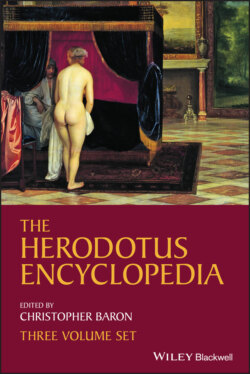Читать книгу The Herodotus Encyclopedia - Группа авторов - Страница 496
APOLLO (Ἀπόλλων, ὁ)
ОглавлениеANGELIKI PETROPOULOU
Hellenic Open University at Patras
Apollo, the youthful god of MUSIC and ARCHERY, was above all an oracular divinity, a master of PROPHECY. He was a god of ecstatic or “mad” DIVINATION. He informed humans through his inspired prophets or prohetesses who acted as his medium. Apollo’s major oracular shrines were at DELPHI, Claros, and Didyma (see BRANCHIDAE). Yet the Delphic ORACLE alone enjoyed an international prestige in the ARCHAIC AGE and classical era, the god’s medium there being a female virgin, the PYTHIA. In Herodotus’ Histories, Delphic Apollo is the most important oracular divinity concerning political and religious matters, consulted by Greeks and Lydians.
Apollo was consulted by the Lydians after GYGES killed CANDAULES and took the kingship (1.12–14). The oracle confirmed Gyges’ kingship, which established the dynasty of the MERMNADAE—but also warned that they would lose the throne in the fifth generation. Gyges expressed his gratitude by dedicating to Apollo many SILVER and GOLD vessels. CROESUS, the last of the Mermnadae, during the planning of an attack on the Persian Empire, tested the wisdom of prominent Greek oracles (1.46–49). Apollo’s Delphic oracle and the Boeotian oracle of AMPHIARAUS alone passed the test, Amphiaraus’ oracle being housed in the temple of Apollo Ismenius in Herodotus’ time. Croesus, sending numerous gifts of gold to DELPHI, asked the oracle whether he should make war on PERSIA (1.53–56.1). Pleased with the Pythia’s response, Croesus marched against the Persians. When, however, he was captured, he demanded to know why Apollo had encouraged him to make this expedition (1.86–91). The Pythia replied that not even a god could escape his ordained FATE, and that Loxias had simply predicted that “if he attacked the Persians, he would destroy a great empire”; it was Croesus who had neglected to consider whose empire that was (1.91.1–4). CLEOMENES, the Spartan king, on being informed that he had burned the sacred grove of the hero Argus, accused Loxias of leading him to believe that he would capture the city of ARGOS (6.80). Apollo’s indirect and veiled revelation was the reason why he was called Loxias, “the Oblique.”
Phoebus Apollo urged BATTUS (I), when he visited Delphi, to establish a colony in LIBYA, leading to the foundation of CYRENE (4.155–58). DORIEUS, on being advised to establish a colony in SICILY, asked the Pythia whether he would capture the land he was heading for, and received a positive reply (5.43). The DOLONCIANS, pressed by war, sent their kings to Delphi to ask about the war. The Pythia replied that they should invite to their land the first man to offer them hospitality after they left the shrine, and make him their founder. This happened to be MILTIADES THE ELDER (6.34–37).
During Xerxes’ expedition against Greece in 480 BCE, the Delphic oracle urged the offering of PRAYERS to the WINDS (7.178), which resulted in the destruction of a large part of the Persian fleet off ARTEMISIUM and EUBOEA (7.189–90). The Pythia’s promise to the Athenians that “the wooden wall would not be taken,” which was interpreted by THEMISTOCLES as referring to the fleet, resulted in the Athenian victory at SALAMIS (7.140–41). The Delphic oracle foretold the DEATH of MARDONIUS and his soldiers, and by means of oracles indirectly designated the specific site of PLATAEA (8.114; 9.33–5). The “oracular wisdom” of Apollo played the single greatest “religious” role, as Mikalson (2003) has argued. The golden TRIPOD that the Greeks dedicated at Delphi from the spoils of Plataea was a token of their gratititude (9.81.1).
SEE ALSO: Carneia; Causation; Colonization; Dedications; Gods and the Divine; Hyacinthia; Religion, Greek
